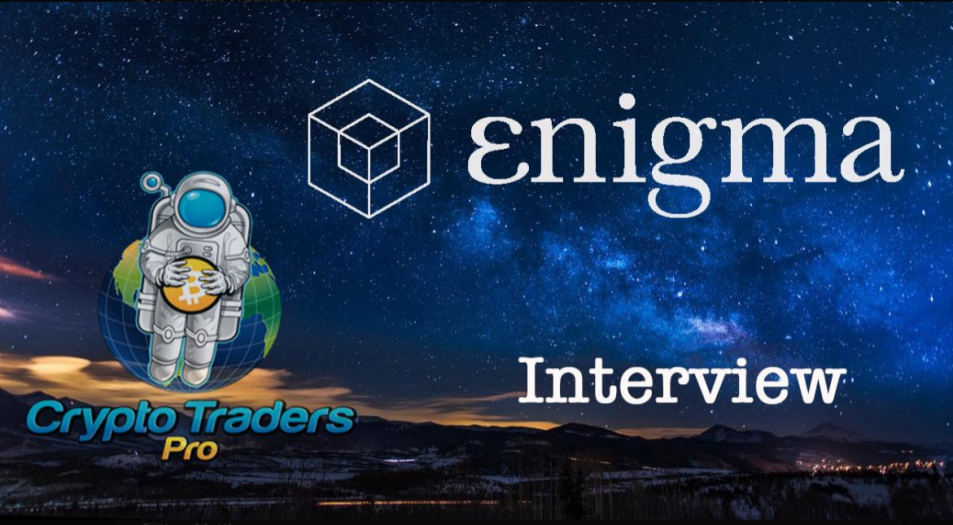
I had the pleasure of interviewing Tor Bair, Head of Marketing of Enigma.
What is your background? Do you do any trading?
My background before Enigma is pretty varied. I was an economics major in college, deeply interested in behavioral economics and incentives. After school I worked as an options trader for about four years, so I was actively trading a number of different products and markets. Then I went back to school for my MBA at MIT, where I studied blockchain technology, data science and analytics, digital marketing, and social media. I met the Enigma co-founders at MIT, and then joined on with them last year to help expand our community and spread our vision for a more decentralized future.
I don’t do currently do any crypto trading myself – it might be considered a conflict of interest. I do, however, watch crypto markets (and traditional markets) with great interest. I have a great deal of experience, so I can identify the common price patterns and trends. I can also spot price manipulation and pump and dumps pretty easily. In many ways, crypto markets are not that different from traditional illiquid markets. My personal thesis is that taking the long view is always preferable at this stage of industry growth.
What is Enigma in 1 minute?
Enigma is a privacy protocol – a critical technology that solves the two biggest issues for blockchains: scalability and privacy. It’s the missing piece for blockchains when it comes to fully enabling decentralization. Based on our co-founder’s MIT thesis, Enigma is a second-layer network for private, distributed computations. With Enigma, “smart contracts” become “secret contracts,” where data is kept hidden from nodes in the Enigma network that perform computations. This functionality is essential for protecting sensitive data and creating truly decentralized applications. The Enigma protocol can have important applications across industries, including data marketplaces, finance, healthcare, credit, and identity – all of which we’re exploring with our partners. Enigma is a project at the scale of Ethereum or EOS, and we have a long roadmap ahead of us. We are committed to achieving our complete vision for a decentralized future.
Enigma seems like a protocol layer designed to provide value to every blockchain in the ecosystem. Is that a fair assessment? Is it comparable to Lightning Network?
Yes, we intend to provide value to the ecosystem broadly. One concern I have is that many projects springing up now are still centralizing value – that is, they’re not additive to the blockchain space overall. Right now we should not be seeing this space as zero sum. We still need fundamental technological innovations for decentralization to succeed. You’re always better off making friends than enemies. Enigma is being built at the protocol level for this reason, and it will be open source. There are so many talented dApp developers waiting for a solution like Enigma – we don’t want to restrict anyone. We’re also building our own applications for Enigma, including our decentralized data marketplace and Catalyst, our platform for data-driven cryptocurrency investment and trading.
Protocols like Lightning that seek to improve the performance of existing blockchains are essential. That said, Enigma’s utility is a bit different than protocols like Lightning Network or Raiden. While we are also looking to solve issues of scalability, we are focused on privacy for smart contracts, not transactions. We also do not have to operate as a second-layer solution – our aim is to have dApps able to run entirely on the Enigma network.
Why was Enigma developed?
Enigma was the brainchild of Guy Zyskind, our co-founder and CEO. While researching blockchain at MIT in 2014, Guy realized that the technology had the potential to revolutionize data privacy and ownership. Due to its value, data had become overcentralized. Decentralization could return control of data from institutions back to the individual. However, Guy’s research revealed that blockchain had substantial limitations that needed to be addressed for this vision of decentralization to be realized. His research turned into the Enigma whitepaper, which has since been downloaded more than 100,000 times, as well as “Decentralizing Privacy,” which is now one of the most highly cited papers in the space.
The whitepaper says Enigma isn’t mined because it isn’t a currency or a blockchain. Why is there a coin? What does it do?
The Enigma token is ENG, and it is critical to securing the function of the Enigma network. ENG tokens also serve an important function at the application level.
At the protocol level, ENG is used to incentivize nodes within the Enigma network to store data and perform privacy preserving computations (execute secret contracts). This approach is similar to Ethereum’s use of gas. Nodes will be required to hold ENG deposits to ensure there are no bad actors.
ENG will also be used by potential applications of the Enigma protocol, including accessing data on our decentralized data marketplace. The Enigma Data Marketplace is launching on mainnet soon. This marketplace will power all crypto-financial data used on Catalyst.
Enigma focuses on adding privacy to existing blockchains. What is the most private/anonymous currency in your opinion?
Transactional privacy is very different from what we’re trying to solve, which is data privacy. Right now smart contracts are “public contracts,” meaning the data the contracts use is on-chain and exposed. The potential use cases for these types of contracts are limited. For full adoption by industry or by individuals, privacy for the data used by smart contracts must be maintained. That’s the vision of “secret contracts.”
By contrast, cryptocurrencies don’t need to be anonymous to have value. In fact, it might be preferable to have transaction data be more open in order to build network effects. It’s certainly worked for Bitcoin. That said, there’s clearly demand for anonymous currencies. I can’t say which is the strongest or safest or which has the most potential, but I take the opinion of cryptographers very seriously and generally ignore the opinions of speculators. As always, you have to do your own research.
What would absolute success look like for Enigma?
Reshaping the world and unlocking billions in value by enabling truly decentralized applications. Right now “decentralized applications” are usually using centralized data sources – they have all the same risks as centralized applications and few of the benefits. We’re still far from realizing the dream of decentralization. To succeed, we need to find partners who can build with us and grow a supportive community that wants to stand behind us. We know we’re on the right path because our community of developers is growing and partners are seeking out our solutions. However, we have many, many years to go before we realize our true vision.
What is the biggest misconception about Enigma that you wish you could change?
There’s a lot of noise in crypto, so it’s not surprising that some people aren’t clear about what we are building. Some people think we’re another privacy coin like Monero. Some people think we are only building Catalyst, or only building a data marketplace. There are so many facets to our project that it is challenging to wrap your head around our full vision at once. But the closer you look at Enigma, the more you can see the clarity of our vision: a more decentralized future, enabled by decentralized privacy. We have an extremely supportive core community who has taken the time to research our project and understand the complexity of our technology and our approach to success. We’ll continue to do better at telling our story.
Bitcoin has been notoriously slow to develop while smaller projects come up with excellent innovations. People commonly say that the other projects in the cryptosphere exist to feed ideas to Bitcoin. What are your thoughts on that?
That seems to the maximalist perspective. I don’t believe that all projects in this space should converge to Bitcoin, or even converge to any blockchain. What Enigma is doing is very different than what Bitcoin enables. I think people in this space exist to feed ideas to each other. There is cross-pollination and innovation. If we want the space to grow, we need to stop thinking about ourselves as members of tribes. We need to focus on the problems to be solved, not which project will take credit – that’s just more centralization. I think most people agree that’s the healthy approach, but incentives are not necessarily aligned there. We’re working hard to build a community that understands that innovation always comes first.



